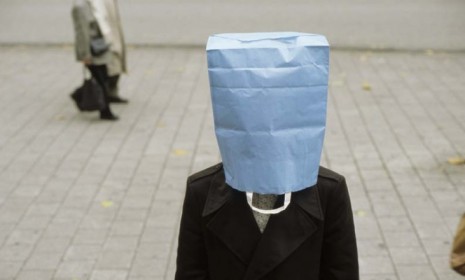Do ugly people need legal protection?
Quite possibly, says economist Daniel S. Hamermesh in The New York Times, since the more repellant among us are constantly discriminated against

A free daily email with the biggest news stories of the day – and the best features from TheWeek.com
You are now subscribed
Your newsletter sign-up was successful
According to the old cliche, "beauty is in the eye of the beholder." But according to economists, beauty is a measurable trait that can deliver a huge profit to someone who's easy on the eyes. One study found that American workers who ranked in the bottom seventh in looks made nearly a quarter of a million dollars less over their career than a colleague who was considered to be in the top one-third. "Most of us, regardless of our professed attitudes, prefer as customers to buy from better-looking salespeople, as jurors to listen to better-looking attorneys, as voters to be led by better-looking politicians, as students to learn from better-looking professors." In light of such findings, making sure the homely aren't discriminated against could be the next "legal frontier," writes economics professor Daniel S. Hamermesh in The New York Times. "Economic arguments for protecting the ugly are as strong as those for protecting some groups" — like the handicapped or racial minorities — who are already covered by legislation. "So why not go ahead and expand protection to the looks-challenged?" Here, an excerpt:
We actually already do offer such protections in a few places, including in some jurisdictions in California, and in the District of Columbia, where discriminatory treatment based on looks in hiring, promotions, housing and other areas is prohibited. Ugliness could be protected generally in the United States by small extensions of the Americans With Disabilities Act. Ugly people could be allowed to seek help from the Equal Employment Opportunity Commission and other agencies in overcoming the effects of discrimination. We could even have affirmative-action programs for the ugly.
Read the entire article in The New York Times.
The Week
Escape your echo chamber. Get the facts behind the news, plus analysis from multiple perspectives.

Sign up for The Week's Free Newsletters
From our morning news briefing to a weekly Good News Newsletter, get the best of The Week delivered directly to your inbox.
From our morning news briefing to a weekly Good News Newsletter, get the best of The Week delivered directly to your inbox.
A free daily email with the biggest news stories of the day – and the best features from TheWeek.com
-
 How the FCC’s ‘equal time’ rule works
How the FCC’s ‘equal time’ rule worksIn the Spotlight The law is at the heart of the Colbert-CBS conflict
-
 What is the endgame in the DHS shutdown?
What is the endgame in the DHS shutdown?Today’s Big Question Democrats want to rein in ICE’s immigration crackdown
-
 ‘Poor time management isn’t just an inconvenience’
‘Poor time management isn’t just an inconvenience’Instant Opinion Opinion, comment and editorials of the day